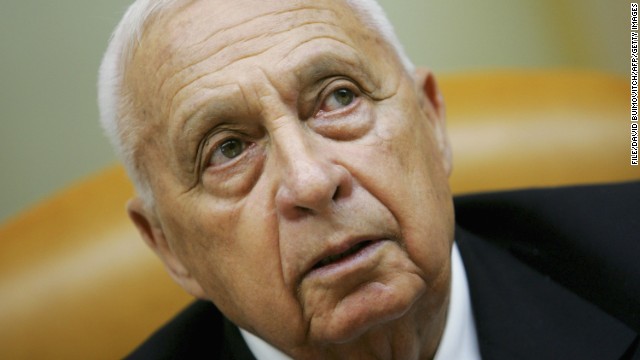Alex Kolomoisky / AP
An Israeli powerhouse, Sharon has been a central figure in the nation's military and political history.
By Martin Fletcher, Correspondent, NBC News
Ariel Sharon, the former prime minister and ex-general who embodied Israel's military might, has died, Israeli radio and television announced on Saturday.

The 85-year-old Sharon had been in a coma at the Sheba Medical Center near Tel Aviv for eight years after suffering a stroke in 2006.
Despised by Arabs for his hardline policies, Sharon was respected by Israelis for his military prowess and patriotism.
Eight years after a stroke left him in a vegetative state, the 85-year-old dies. NBC News' Martin Fletcher reports.
Sharon, Israel's controversial 11th prime minister, earned the nickname “The Bulldozer” early in his career because of his reputation for stopping at nothing.
By ignoring orders as a soldier, he turned defeat into victory over Egypt in the 1973 October War. When then Gen. Sharon led his troops across the Suez Canal, encircling the Egyptian Third Army, he violated orders from the military’s Southern Command.
Later, Defense Minister Moshe Dayan called Sharon the hero of the war. But, he added, had Sharon failed, he could have faced a court martial.
As Israel’s defense minister in the 1982 war against the Palestine Liberation Organization, Sharon sent the Israeli army all the way to Beirut, while being accused of misleading the cabinet about his true intentions. This action led to his greatest humiliation and his other nickname, given to him by Arabs: “The Butcher.”
When members of a Lebanese-Christian paramilitary group known as Phalangists entered the Palestinian refugee camps of Sabra and Shatila in Beirut, Sharon's soldiers, responsible for security in the area, allowed them in and even evacuated the wounded.
But they denied responsibility for what happened inside the camps, where the Phalangists massacred at least 800 Palestinian and Lebanese civilians over three days. The Sabra-Shatila massacre, as it came to be known, was one of the bloodiest chapters in Lebanon's 14-year civil war.
Israel's subsequent Kahan commission of inquiry found that Sharon should have anticipated what the Christian militants would do -- and thus established he bore "personal responsibility" for the massacre. It recommended he be removed from the defense ministry, with the understanding that he would never hold that office again.
Instead, in 2001, he became prime minister.
As part of his election campaign in September 2000, Sharon, then leader of the opposition party, led a Jewish delegation to the Temple Mount, the holiest site in Judaism. The Al-Aqsa Mosque is part of the compound that Jews call the Temple Mount and is considered the third holiest site in Islam. The visit, which was aimed at emphasizing the Jewish claim to the holy place, sparked outrage among the Palestinians who called it a deliberate provocation.
The day after Sharon’s visit, following Friday prayers, large riots broke out around the Old City of Jerusalem. In the following days, demonstrations erupted across the West Bank and Gaza.
Many mark Sharon’s visit to the Temple Mount as the start of the Second Intifada and the end of the peace process. An estimated 3,000 Palestinians and 1,000 Israelis were killed in the violence that did not end until 2005.
The violent uprising marked Sharon’s time as prime minister. But the man who had been known as the greatest field commander in Israel's history, the champion of Jewish settlers and of expanding Israel's borders, stunned the nation by ordering the evacuation of every single Jewish settler from Gaza. He had come to the conclusion that Israel could not have everything. To keep most of the West Bank it would have to give up Gaza and then negotiate peace with the Palestinians.
It was a total about-face for one of Israel's greatest right-wingers. But before he could continue with his plan, on Jan. 4, 2006, at the height of his political power, he was struck down by a massive stroke and remained in a coma until his death.
"He'll be remembered as the last of his generation of Israeli fighters and founders," Dedi Cohen, a 38-year-old lawyer, told Reuters in Tel Aviv.
"He was a bulldozer who got things done. I know he was controversial, but he had values. He stood for something. That's missing today," Cohen said.
His decision to pull out of Gaza was still considered controversial.
"As a prime minister he took a very brave step in leaving the (Gaza) settlements. He did something unexpected that was very surprising for a right-wing prime minister, for the better," Anat Harel, 25, a computer science student in the southern town of Ashkelon told Reuters.
But in the Gaza Strip, Sharon was still reviled by many Palestinians.
"Ariel Sharon is going the same direction as other tyrants and criminals whose hands were covered in Palestinian blood," Hamas leader, Khalil al-Hayya, told Reuters.
And there was no sympathy either in the occupied West Bank.
"He's a terrible person," said Rauf Ramia, a laborer from the Qalandia refugee camp.
Regardless of his differing legacies among Arabs and Israelis, Sharon will always be remembered as a man who obeyed nobody's rules but his own.
Reuters contributed to this report.
View the original article here
Sunday, January 12, 2014 | 0
comments | Read More

 Jim Hollander / EPA
Jim Hollander / EPA